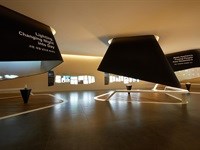Samsung Museum opens in Korea
The 10,950 sqm five-story museum is divided into three exhibition halls. In halls 1 and 2, visitors can learn about more than 150 historical items while hall 3 exhibits current and future innovation. Each hall has information about each product as well as videos specially created to provide added context and give that visual experience.

Age of Inventors
Exhibition hall 1 tells the story of the dawn of the electronics industry between the 18th and 20th centuries and includes some of the most innovative and historic inventions by Michael Faraday, Thomas Edison and Graham Bell. The hall is divided into five areas: discovery of electricity, lighting, telecommunications, home appliances and radio.
The original models of the following break-through innovations are exhibited in Hall 1:
• Leyden Jars, Pieter van Musschenbroek, 1745
• Guglielmo Marconi's Wireless Telegraph 'Maggie', 1896
• Edison early filament lamp, 1900s
• Maytag electric washing machine no. 45, 1911
Visitors can watch videos that introduce how these five historic inventions improved and changed lives from the screens inside the cones. The hall also illustrates detailed company pasts for pioneers in the industry: Siemens (established 1847); AT&T (1885); Philips (1891); GE (1892); and, NEC (1899).

Age of Industry Innovation
Hall 2 consists of three zones that provide insight into the key pillars that underpin the electronics industry: Semiconductor, Display and Mobile. The advent of semiconductors enabled high speed information processing and the development of displays and mobile communications continue to contribute to making information accessible and universal.
Guests can learn about technology landmarks such as the origination of the transistor, the development of integrated circuits, the history of the semiconductor, and the evolution of display technology. The mobile zone features the world's first mobile phone as well as the world's first smartphone. There are also examples of how the company's innovation in telecommunications has benefited those around the world, such as the time when it loaded a GT-i7410 projector phone with encouraging messages and video clips to boost the morale of the 33 Chilean miners trapped underground for 69 days in 2010.
Located in hall 2 alongside company products are those created by other leading businesses that have advanced modern society such as Intel, Sony, Sharp, Nokia and Motorola.
There is also a child friendly and educational lab where children can learn about semiconductors, displays and mobile communications.

Age of Creation
The final hall highlights the company's vision for the future and displays its most advanced technology. This hall is divided into three areas: The S/I/M Theatre, the Product Gallery and the nanum gallery.
The S/I/M Theatre features a 180-degree UHD panorama screen where visitors can learn about the company's commitment to innovation and building a better future. The Product Gallery explores the future of society that it envisions through its leading innovations, ranging from B2B solutions to the latest world-class products such as the Curved TV and Smart Home services.
The B2B zone is divided into seven sections: Retail, Healthcare, Hospitality, Government, Finance, Enterprise Mobility and Education. Each B2B section displays its range of B2B products and solutions that visitors can interact with and experience first hand.

The nanum gallery exhibits souvenirs and the company's social contribution projects. Proceeds from the gallery will directly support and fund on-going social contribution programmes.
Samsung History Hall
Located on the first floor of the S/I/M is the Samsung History hall that talks specifically about the corporate philosophy and history of innovation. Visitors can learn about the beginnings of the company, the challenges that have been overcome and the 'New Management' company ethos that successfully transformed the company and, by extension, the electronics industry.
For more information, go to samsunginnovationmuseum.com.






